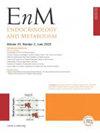Scaling Insulin-Producing Cells by Multiple Strategies.
IF 3.9
3区 医学
Q2 ENDOCRINOLOGY & METABOLISM
引用次数: 0
Abstract
In the quest to combat insulin-dependent diabetes mellitus (IDDM), allogenic pancreatic islet cell therapy sourced from deceased donors represents a significant therapeutic advance. However, the applicability of this approach is hampered by donor scarcity and the demand for sustained immunosuppression. Human induced pluripotent stem cells are a game-changing resource for generating synthetic functional insulin-producing β cells. In addition, novel methodologies allow the direct expansion of pancreatic progenitors and mature β cells, thereby circumventing prolonged differentiation. Nevertheless, achieving practical reproducibility and scalability presents a substantial challenge for this technology. As these innovative approaches become more prominent, it is crucial to thoroughly evaluate existing expansion techniques with an emphasis on their optimization and scalability. This manuscript delineates these cutting-edge advancements, offers a critical analysis of the prevailing strategies, and underscores pivotal challenges, including cost-efficiency and logistical issues. Our insights provide a roadmap, elucidating both the promises and the imperatives in harnessing the potential of these cellular therapies for IDDM.通过多种策略扩大胰岛素分泌细胞的规模。
在抗击胰岛素依赖型糖尿病(IDDM)的过程中,来自已故捐献者的异基因胰岛细胞疗法代表了治疗上的一大进步。然而,这种方法的适用性受到供体稀缺和持续免疫抑制需求的阻碍。人类诱导多能干细胞是生成合成功能性胰岛素分泌β细胞的一种改变游戏规则的资源。此外,新方法可直接扩增胰腺祖细胞和成熟的β细胞,从而避免长期分化。然而,实现实际的可重复性和可扩展性是这项技术面临的巨大挑战。随着这些创新方法日益突出,对现有扩增技术进行全面评估至关重要,重点是其优化和可扩展性。本手稿描述了这些前沿进展,对现行策略进行了批判性分析,并强调了包括成本效益和物流问题在内的关键挑战。我们的见解提供了一个路线图,阐明了利用这些细胞疗法的潜力治疗 IDDM 的前景和当务之急。
本文章由计算机程序翻译,如有差异,请以英文原文为准。
求助全文
约1分钟内获得全文
求助全文
来源期刊

Endocrinology and Metabolism
Medicine-Endocrinology, Diabetes and Metabolism
CiteScore
6.60
自引率
5.90%
发文量
145
审稿时长
24 weeks
期刊介绍:
The aim of this journal is to set high standards of medical care by providing a forum for discussion for basic, clinical, and translational researchers and clinicians on new findings in the fields of endocrinology and metabolism. Endocrinology and Metabolism reports new findings and developments in all aspects of endocrinology and metabolism. The topics covered by this journal include bone and mineral metabolism, cytokines, developmental endocrinology, diagnostic endocrinology, endocrine research, dyslipidemia, endocrine regulation, genetic endocrinology, growth factors, hormone receptors, hormone action and regulation, management of endocrine diseases, clinical trials, epidemiology, molecular endocrinology, neuroendocrinology, neuropeptides, neurotransmitters, obesity, pediatric endocrinology, reproductive endocrinology, signal transduction, the anatomy and physiology of endocrine organs (i.e., the pituitary, thyroid, parathyroid, and adrenal glands, and the gonads), and endocrine diseases (diabetes, nutrition, osteoporosis, etc.).
 求助内容:
求助内容: 应助结果提醒方式:
应助结果提醒方式:


